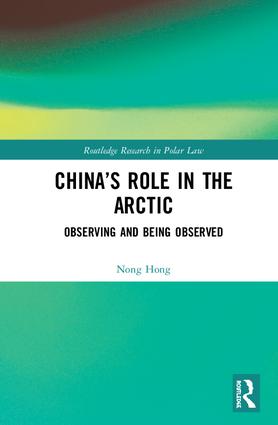Home / Books & Journal Articles / Book / China’s Role in the Arctic: Observing and Being Observed


Executive Director & Senior Fellow
This book explores the growing interests of China in the Arctic and examines the nature of its interests and motivations in maintaining its involvement and presence in the region.
The new geopolitical landscape of the Arctic today is a significant departure from the great power politics that existed in the region during the Cold War era. Apart from traditional Arctic states, more and more international organizations and non-Arctic states are showing an increased interest in this region, not least China. Many have attempted to interpret China’s intention in moving to the high north and this book aims to add to the existing literature from three approaches: China’s participation in the international institutions, China’s relationships with the Arctic stakeholders, and China’s sectoral engagement in the Arctic. In taking a three-dimensional approach to the analysis, the author builds a comprehensive picture of China’s interests and activities in the Arctic, not only from the perspective of China, but also from the viewpoint of other Arctic States (Russia, Canada, the U.S., Norway, Sweden, Denmark, Finland, and Iceland).
One of the first books in English to cover the subject since the release of China’s Arctic Policy White Paper in January 2018, this analysis will be of interest to academics, students of Arctic studies, maritime law and international law, as well as policy-makers in Arctic and non-Arctic states.
Publication date: May 2020
ISBN: 978-0-367-27869-4

Executive Director & Senior Fellow
Dr. Nong Hong holds a PhD of interdisciplinary study of international law and international relations from the University of Alberta, Canada and held a Postdoctoral Fellowship in the University’s China Institute. She was ITLOS-Nippon Fellow for International Dispute Settlement (2008-2009), and Visiting Fellow at Australian National Centre for Ocean Resources and Security (2019), the Center of Oceans Law and Policy, University of Virginia (2009) and at the Max Planck Institute for Comparative Public Law and International Law (2007). She is concurrently a research fellow with China Institute, University of Alberta, Canada, and the National Institute for South China Sea Studies, China. Her research takes an interdisciplinary approach to examining international relations and international law, with focus on International Relations and Comparative Politics in general; ocean governance in East Asia and the Arctic; law of the sea; international security, particularly non-traditional security; and international dispute settlement and conflict resolution.

The Institute for China-America Studies is an independent nonprofit, nonpartisan research organization dedicated to strengthening the understanding of U.S.-China relations through expert analysis and practical policy solutions.
1919 M St. NW Suite 310,
Washington, DC 20036
icas@chinaus-icas.org
(202) 968-0595
© 2025 INSTITUTE FOR CHINA-AMERICA STUDIES. ALL RIGHTS RESERVED.
Diverging Currents: U.S.–China Strategies on Deep Seabed Mining and the Future of Ocean Governance